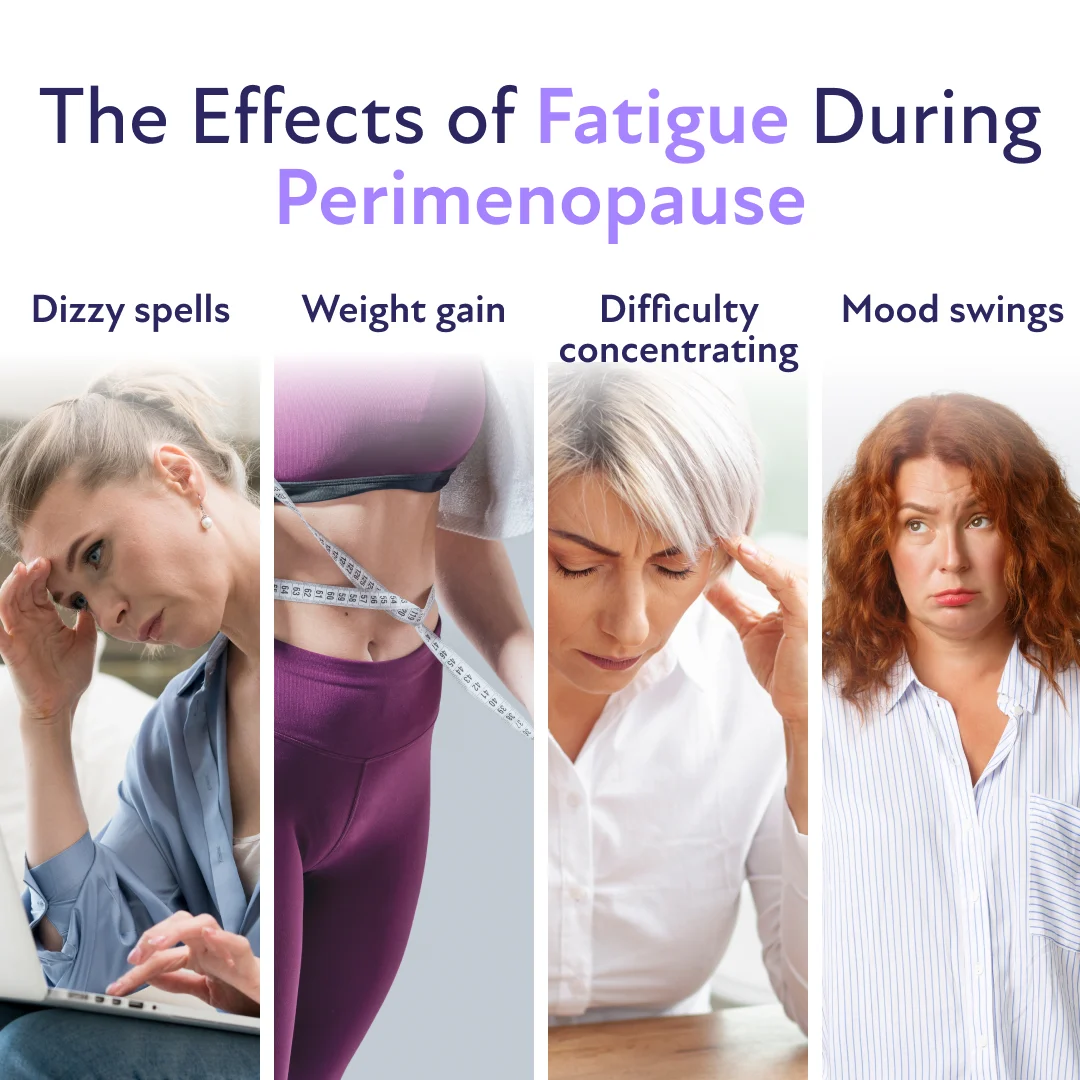Everyone experiences tiredness from time to time. It's normal for people to feel overtired or overworked occasionally, and usually, they can recover well. However, unrelenting exhaustion or fatigue is different. It lasts longer, is more severe, and doesn’t get better with rest.
This kind of fatigue leaves individuals feeling persistently drained, depleting their energy and motivation, and impacting their concentration and overall quality of life. Such fatigue can also affect emotional and psychological well-being.
Many women experience these symptoms during menopause. Research shows that 85.3% of postmenopausal women and 46.5% of perimenopausal women experience symptoms of physical and mental exhaustion compared to just 19.7% of premenopausal women.1 For those experiencing fatigue, applying the strategies mentioned on this page or consulting a physician can help reduce the duration or severity of symptoms.
What is menopause fatigue?
Menopause fatigue is a persistent exhaustion that lingers even after rest, and it’s often linked to decreasing estrogen and other hormonal changes during this period. This type of fatigue drains energy, motivation, and concentration, making it difficult for many women to carry out daily activities. For some, it becomes so debilitating that it severely impacts their everyday life.2
Why does menopause make you feel tired?
Tiredness during menopause is closely linked to a decline in hormonal levels, especially estrogen. These hormones are crucial for metabolism, the process by which the body burns and uses calories to support normal functions. As their levels decrease, energy levels also drop, resulting in feelings of fatigue.3

Causes of Menopause Fatigue
Some common causes of menopause fatigue include the following:
Brain Changes
As women approach menopause, their hormone levels fluctuate dramatically and cause the brain to frequently wake up at night, resulting in fatigue. Additionally, lower progesterone levels can cause irritability and prevent relaxation.4
Sleep Troubles
Hormones like progesterone and estrogen protect women from sleep apnea, a severe sleep disorder where breathing stops and starts repeatedly. During menopause, the production of progesterone decreases, reducing this natural protection and increasing the risk of developing sleep apnea. Oxygen deprivation from sleep apnea may cause frequent awakenings throughout the night.5
Symptoms like hot flashes and night sweats are also likely culprits of poor sleep. Changes in the brain that lead to vasomotor symptoms, such as hot flashes, can trigger the body to wake up during the night.
Life Changes
Societal pressures may also contribute to stress and fatigue during this transitional phase. Many women at this age are caring for children and aging parents and working while experiencing significant life changes, adding to the overall strain and impacting sleep quality.6
How to Manage Menopause Fatigue
Experts believe these strategies can help women manage fatigue and feel rejuvenated:
Nutrition
Consuming foods high in protein (such as chicken, eggs, nuts, and yogurt), healthy fats (like avocado and oily fish), iron (found in red meat, green leafy vegetables, and dried fruits like apricots), and fiber (such as fortified breakfast cereals, whole wheat bread, and lentils) can enhance energy levels.7
Exercise
Although getting out of bed when feeling exhausted can be challenging, exercise is one of the best strategies for fatigue. Studies suggest that moderate-to-vigorous physical activity is associated with increased energy levels. Exercise is also crucial for maintaining bone density and cardiovascular health after menopause.8
Experts recommend activities that are both enjoyable and manageable to stay consistent. For example, taking a short walk during lunch breaks or joining a yoga class can be effective. The key is to find something pleasurable and sustainable. If an activity isn't enjoyable or easy to fit into a regular schedule, it's better to try something else. Engaging in satisfying activities helps form lasting habits.
Avoiding Stimulants and Alcohol
It can be tempting to rely on stimulants like caffeine when energy levels are low. However, excessive caffeine intake can disrupt sleep, leading to increased tiredness during the day. Similarly, while alcohol may help induce drowsiness for those struggling to sleep, it generally lowers overall sleep quality and can trigger hot flashes in some individuals.9
Sleep Hygiene
Maintaining a regular schedule for sleeping and waking can help improve sleep quality and boost energy levels. The following practices can help establish a consistent routine:9
Going to bed and waking up at the same time every day, when possible
Avoiding taking naps during the daytime
Refraining from using screens and devices before bed
Drinking warm beverages or take warm baths or showers in the evening
Using the bedroom only for sleep or intimacy
Vitamins
Vitamins or supplements aren't typically needed unless there's a deficiency. It's best to consult a doctor to determine if taking a vitamin might help alleviate fatigue.
Can hormone replacement therapy (HRT) help fatigue during menopause?
The primary medical treatment for menopause symptoms is hormone therapy, which works by replacing declining hormones and may alleviate fatigue. It can also enhance sleep quality by reducing hot flashes, positively affecting energy levels. Hormone therapy is available in various forms, including oral tablets, topical creams and gels, and skin patches.10
Experiencing menopausal fatigue? Discover if HRT is right for you.
If you’ve entered the menopause transition and are struggling with fatigue, you don’t have to suffer in silence. Take our brief menopause quiz to see if you’re an eligible candidate for HRT. Get started with Winona to take the first step toward feeling better.